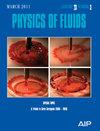LKFlowNet: A deep neural network based on large kernel convolution for fast and accurate nonlinear fluid-changing prediction
IF 4.1
2区 工程技术
Q1 MECHANICS
引用次数: 0
Abstract
The rapid development of artificial intelligence has promoted the emergence of new flow field prediction methods. These methods address challenges posed by nonlinear problems and significantly reduce computational time and cost compared to traditional numerical simulations. However, they often struggle to capture the dynamic sparse characteristics of the flow field effectively. To bridge this gap, we introduce LKFlowNet, a new large kernel convolutional neural network specifically designed for complex flow fields in nonlinear fluid dynamics systems. LKFlowNet adopts a multi-branch large kernel convolution computing architecture, which can skillfully handle the complex nonlinear dynamic characteristics of flow changes. Drawing inspiration from the dilated convolution mechanism, we developed the RepDWConv block, a re-parameterized depthwise convolution that extends the convolutional kernel's coverage. This enhancement improves the model's ability to capture long-range dependencies and sparse structural features in fluid dynamics. Additionally, a customized physical loss function ensures accuracy and physical consistency in flow field reconstruction. Comparative studies reveal that LKFlowNet significantly outperforms existing neural network architectures, providing more accurate and physically consistent predictions in complex nonlinear variations such as velocity and pressure fields. The model demonstrates strong versatility and scalability, accurately predicting the flow field of various geometric configurations without modifying the architecture. This capability positions LKFlowNet as a promising new direction in fluid dynamics research, potentially revolutionizing flow field prediction by combining high efficiency and accuracy. Our results suggest that LKFlowNet could become an indispensable tool in intelligent flow field prediction, reshaping the analysis and processing of fluid dynamics.LKFlowNet:基于大核卷积的深度神经网络,用于快速准确地预测非线性流体变化
人工智能的快速发展促进了新流场预测方法的出现。与传统的数值模拟相比,这些方法能够解决非线性问题带来的挑战,并显著减少计算时间和成本。然而,这些方法往往难以有效捕捉流场的动态稀疏特征。为了弥补这一差距,我们引入了 LKFlowNet,这是一种新的大核卷积神经网络,专为非线性流体动力学系统中的复杂流场而设计。LKFlowNet 采用多分支大核卷积计算架构,能巧妙地处理流动变化的复杂非线性动态特性。受扩张卷积机制的启发,我们开发了 RepDWConv 模块,这是一种重新参数化的深度卷积,可扩展卷积核的覆盖范围。这一改进提高了模型捕捉流体动力学中长程依赖性和稀疏结构特征的能力。此外,定制的物理损失函数确保了流场重建的准确性和物理一致性。对比研究表明,LKFlowNet 的性能明显优于现有的神经网络架构,在速度场和压力场等复杂的非线性变化中提供了更准确和物理上更一致的预测。该模型具有很强的通用性和可扩展性,无需修改架构即可准确预测各种几何配置的流场。这种能力将 LKFlowNet 定位为流体动力学研究中一个前景广阔的新方向,通过结合高效率和高精度,有可能彻底改变流场预测。我们的研究结果表明,LKFlowNet 有可能成为智能流场预测领域不可或缺的工具,重塑流体动力学的分析和处理过程。
本文章由计算机程序翻译,如有差异,请以英文原文为准。
求助全文
约1分钟内获得全文
求助全文
来源期刊

Physics of Fluids
物理-力学
CiteScore
6.50
自引率
41.30%
发文量
2063
审稿时长
2.6 months
期刊介绍:
Physics of Fluids (PoF) is a preeminent journal devoted to publishing original theoretical, computational, and experimental contributions to the understanding of the dynamics of gases, liquids, and complex or multiphase fluids. Topics published in PoF are diverse and reflect the most important subjects in fluid dynamics, including, but not limited to:
-Acoustics
-Aerospace and aeronautical flow
-Astrophysical flow
-Biofluid mechanics
-Cavitation and cavitating flows
-Combustion flows
-Complex fluids
-Compressible flow
-Computational fluid dynamics
-Contact lines
-Continuum mechanics
-Convection
-Cryogenic flow
-Droplets
-Electrical and magnetic effects in fluid flow
-Foam, bubble, and film mechanics
-Flow control
-Flow instability and transition
-Flow orientation and anisotropy
-Flows with other transport phenomena
-Flows with complex boundary conditions
-Flow visualization
-Fluid mechanics
-Fluid physical properties
-Fluid–structure interactions
-Free surface flows
-Geophysical flow
-Interfacial flow
-Knudsen flow
-Laminar flow
-Liquid crystals
-Mathematics of fluids
-Micro- and nanofluid mechanics
-Mixing
-Molecular theory
-Nanofluidics
-Particulate, multiphase, and granular flow
-Processing flows
-Relativistic fluid mechanics
-Rotating flows
-Shock wave phenomena
-Soft matter
-Stratified flows
-Supercritical fluids
-Superfluidity
-Thermodynamics of flow systems
-Transonic flow
-Turbulent flow
-Viscous and non-Newtonian flow
-Viscoelasticity
-Vortex dynamics
-Waves
 求助内容:
求助内容: 应助结果提醒方式:
应助结果提醒方式:


